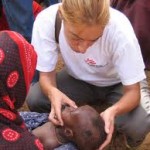Skimming off the top (or, alternately, modal muddle, Part 1)
What so far has come from our survey that may be of interest to those who recruit and employ development and aid workers around the world?
The above is a relevant question, and I will need to get into drill more into the data to arrive at a truly useful answer to that question. In the meantime here is a sense of what the most common/modal answers were to many of the questions.
 So, ‘skimming off’ the modal numbers to this point, our typical respondent is a masters-level educated 30+ year old white female expat aid worker working in the field for a non-faith based “big box” organization from the US or UK that is in a relationship (though no children) and has done work related travel more than 20 times outside of her home country and been deployed at least once for more than 2 years doing development work.
So, ‘skimming off’ the modal numbers to this point, our typical respondent is a masters-level educated 30+ year old white female expat aid worker working in the field for a non-faith based “big box” organization from the US or UK that is in a relationship (though no children) and has done work related travel more than 20 times outside of her home country and been deployed at least once for more than 2 years doing development work.
She became an an worker because she was “following my dream to provide aid to less fortunate” but found that response too limited and in the provided space wrote something like “Above responses are fairly stereotypical and surely apply to some, but I imagine most of us fall in between several of those and other reasons. I always wanted to work in war zones, as a doctor then when I was a very young child, and help the people living in those contexts. Discipline has changed, motivations are more nuanced, but as some always wanted to be lawyers or teachers, I wanted to do humanitarian work.” (36yo female expat aid worker)
Her view is overwhelmingly that being a humanitarian aid worker carries a higher risk of burnout than other professions and has used an array of coping mechanisms to deal with stress/burnout/loss of idealism but her “go to” is physical release (e.g., yoga, running, etc.), though she used the provided space to mention that talking to friends and using social media help (“social release”). (Q26)
Here’s a detailed response from a 30+yo female expat: “Coping with loss of idealism – my main coping mechanism is sharing with other people, obviously with those mostly in the sector/expats who understand and who have similar problem/doubts. It’s a constant path to find answers. Coping with stress is again mainly through social interaction, talking to close people (if they are there) who understand. The crucial part is that they have to have a similar experience, otherwise it’s not possible that they understand and help. Stress coping is complemented by a bit of exercise. Burnout coping is most difficult – too much work to take sufficient holidays. Often leads to “shutting off” as many interactions with the host country as possible. Not a good way, but haven’t found better. Besides time off, of course.” (Q27)
Her level of idealism is lower now than when she first became a humanitarian aid worker and wrote comments like
- “I’m still pretty idealistic about human beings and their potential for beauty, generosity, and progress. I no longer believe aid work has anything to do with bringing these things about.” (36yo male working at HQ)
- “Programs many times are written to fit the Donor and the implementing Agency and they tend to forget why, for whom the program is meant. Millions are spent yearly due to bad program proposals and unrealistic objectives. Many time it is better just to divide the cost of implementing the program that using the money to “try to implement” something that is not implementable.” (31+yo female expat)
- “I keep going back and forth. I believe like I still have strong ideals, but the frustration and the reality on the ground makes me waver sometimes.” (31+yo female expat)
She likes what she does as an aid worker to a great extent (Q28), but it is complicated as seen in this comment from a 25+yo female expat: “People ask whether I ‘enjoy’ or ‘like’ what I do. I always find that a very hard question to answer. Enjoy? No, not really. It can drive me crazy at times, but it’s what makes me feel most alive. There’s a depth of experience not often found in a ‘normal’ job in the UK. The things I don’t like would be similar in any role, e.g. dealing with difficult colleagues.” (Q29)
And then there’s this sober response “The nature of the work (talking of expat aid workers) attracts mainly younger, less experienced people, who are willing and able to live/work under different/foreign/rougher/dangerous conditions – but too often they don’t have the necessary knowledge/experience/qualifications to carry out a competent job. Ideally, it should be the older, expert people who should be working here, to build capacity and bring actual knowledge – but those, understandably, are less willing to live under conditions of this industry (discomfort, danger, food etc). Good intentions are not enough. In the end, we just become mercenaries to good job and life, but are hardly able to “make the difference” we wanted at the beginning.” (25+yo female aid worker)
Q32 asked “Which statement below best describes how satisfied you are that what you do makes a difference for good?” and the most frequent response (nearly half at 49%) was “I feel that on the whole what I do makes a small difference for good.”
So, that’s Part 1. As you can see, the modal responses to our survey offer no big surprises but they do give us a little clearer sense of the diversity, complexity and passion of aid worker voices. Part 2 to come soon….
As usual, email any questions or comments.


 Follow
Follow